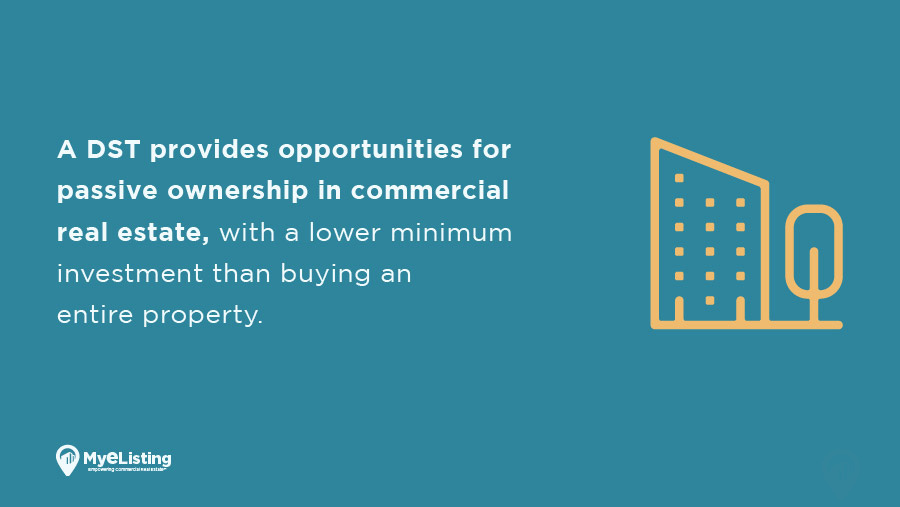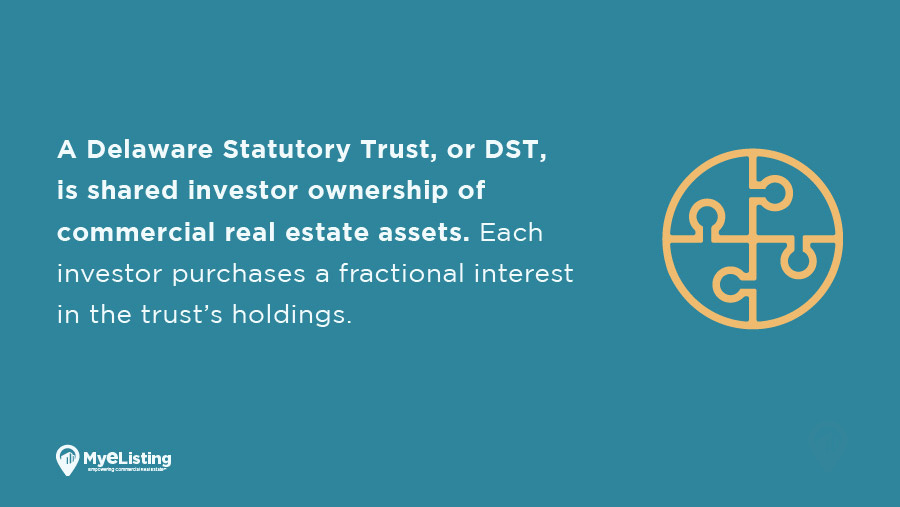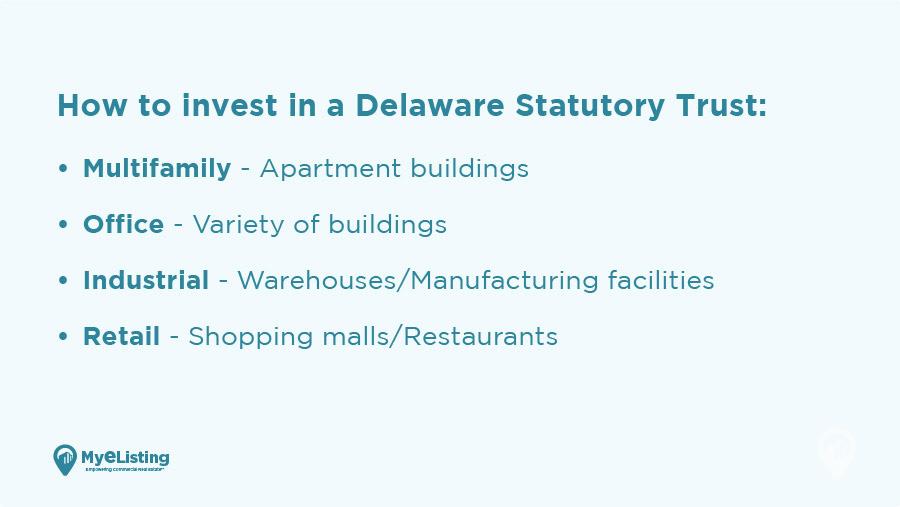How Accredited Investors Can Leverage the Benefits of Delaware Statutory Trusts

Specializes in providing actionable insights into the commercial real estate space for investors, brokers, lessors, and lessees. He covers quarterly market data reports, investment strategies, how-to guides, and top-down perspectives on market movements.


Commercial real estate (CRE) has been popular with savvy accredited investors for decades, and for good reason. In addition to providing several income options, both during ownership and at the time of sale, there may be attractive tax benefits.
An increasing number of investors may want to research the benefits of a Delaware Statutory Trust, or DST. A DST provides opportunities for passive ownership in commercial real estate, with a lower minimum investment than buying an entire property.
If you’re new to Delaware Statutory Trusts, read on to learn more, including why they aren’t limited to investors living in the state of Delaware.
Origins of the Statutory Trust
While the concept of a business trust goes back hundreds of years, no recognized statutory trust existed in the United States until the 1988 passage of the Delaware Statutory Trust Act.
After the Act was signed into law, statutory trusts were recognized as legal entities separate from their trustees. This freed their owners from the limits of corporate law.
Before taking a deep-dive into the pros and cons of DSTs, you may want to review the working basics of these trusts.
What is a Delaware Statutory Trust?

A Delaware Statutory Trust, or DST, is shared investor ownership of commercial real estate assets. Each investor purchases a fractional interest in the trust’s holdings.
- Each DST property is managed by a real estate company that is described as the DST sponsor.
- A typical DST property will have a $30 to $100 million price tag.
- The DST sponsor will be responsible for acquiring the asset before offering investors the chance to “buy in”.
- As more investors participate, their growing investments will eventually displace the original capital produced by the DST sponsor to purchase the CRE property.
- Eventually, the property will be 100% owned by the investors.
Something to keep in mind: No single owner/investor can claim to own any specific aspect of a property. In addition to options for smaller initial investments, here are the details of other benefits.
Why choose a Delaware Statutory Trust?
The ownership structure of a DST may appeal to an investor for some or all of these reasons:
- Investors who are accredited may diversify their portfolio by purchasing ownership in a high-quality CRE asset offered by a DST.
- Investors generally have opportunities to collect income through the property’s rentals.
- Many DST investors receive tax benefits, although this can only be determined by a professional tax advisor.
One tax benefit that makes DSTs particularly attractive to investors is that they may be eligible for 1031 exchanges. If you’re unfamiliar with these, here are details.
Delaware Statutory Trusts and Section 1031 Exchanges
A 1031 exchange is a tax benefit provided by Section 1031 of Internal Revenue Code 1031.
Section 1031 states: “A taxpayer may defer recognition of federal income tax liability, including capital gains, during the exchange of certain types of property.”
In 1979, it was expanded to apply to non-simultaneous real estate purchases and sales, something extremely important to DST investors.
As a result, DSTs are eligible for 1031 exchanges as they are defined as being directly owned by the investors. To defer taxes, the proceeds from the property’s sale must be re-invested by purchasing another CRE property of equal or greater value. This transaction must be completed within 180 days of the prior CRE sale.
The Benefits of 1031 Exchanges for DST Investors
The 1031 exchange enables DST investors to preserve the equity from the sale of their relinquished property. It will become part or all of their investment in their next DST.
Since DST sales usually close within five business days, this offer investors a major advantage. This is because 1031 exchanges must be conducted under short deadlines.
While DSTs offer potentially lucrative benefits, they have their own share of pros and cons that are similar to other real estate investments.
Potential Risks Involved With DSTs
Mainly, investors may find themselves dealing with a lack of expected returns and loss of principal. These may be caused by one or more of the following:
- Failure of a DST property’s tenants to pay rent, or to break their lease;
- Lack of liquidity, depending on the DST sponsor guidelines; or
- Changing market conditions, including interest rate risk.
Also, investors who prefer personal control over real estate investments may want to avoid DSTs.
If you’ve decided that investing in a DST property would be a good fit with your portfolio and preferred risk levels, here are the details of your options.
How to Invest in a Delaware Statutory Trust

One advantage offered by a Delaware Statutory Trust (DST) is the variety of choices. This is because DST sponsors acquire properties from all four commercial real estate (CRE) types:
- Multifamily: Typically, these are apartment buildings.
- Office: These buildings are available in a variety of types.
- Industrial: These include warehouses and manufacturing facilities.
- Retail: Shopping malls, shops, and restaurants fall into this category.
A few DST properties that don’t fit into these CRE categories are called “niche properties”.
Examples of niche properties include assisted living for seniors, combined medical/office space, and self-storage facilities with an on-site management office.
Who can invest in a Delaware Statutory Trust?
Only accredited investors may buy into a DST. These include:
- Individuals with a net worth of at least $1 million (this excludes their primary residence);
- Individuals with an average annual income over $200,000; or
- Couples with a combined income of $300,000 who file joint tax returns.
If you meet the criteria for an accredited investor but haven’t yet attempted to invest in a DST, you aren’t required to file any paperwork or go through a process to claim this status. Instead, this responsibility belongs to the DST sponsor.
List & Browse Commercial Real Estate for Free on MyEListing.com!
You can list and browse commercial real estate for free right here on MyEListing.com.
Simply sign up for a free account and get unlimited access to accurate local market intelligence, customized property type alerts, comp software, and more.
Article Search
Share
All Article Categories








